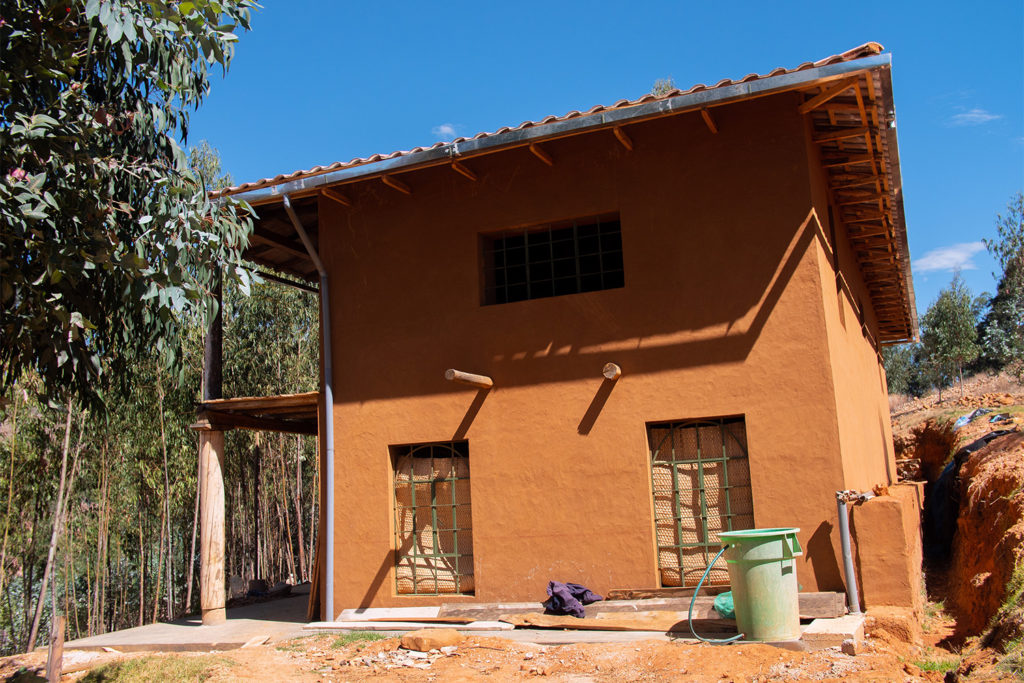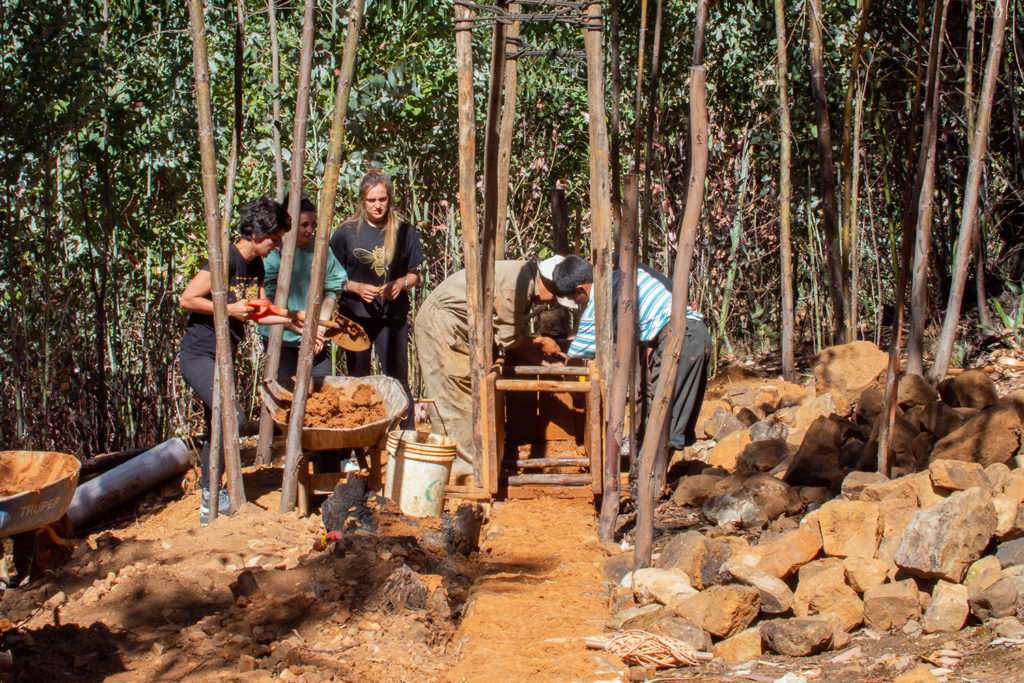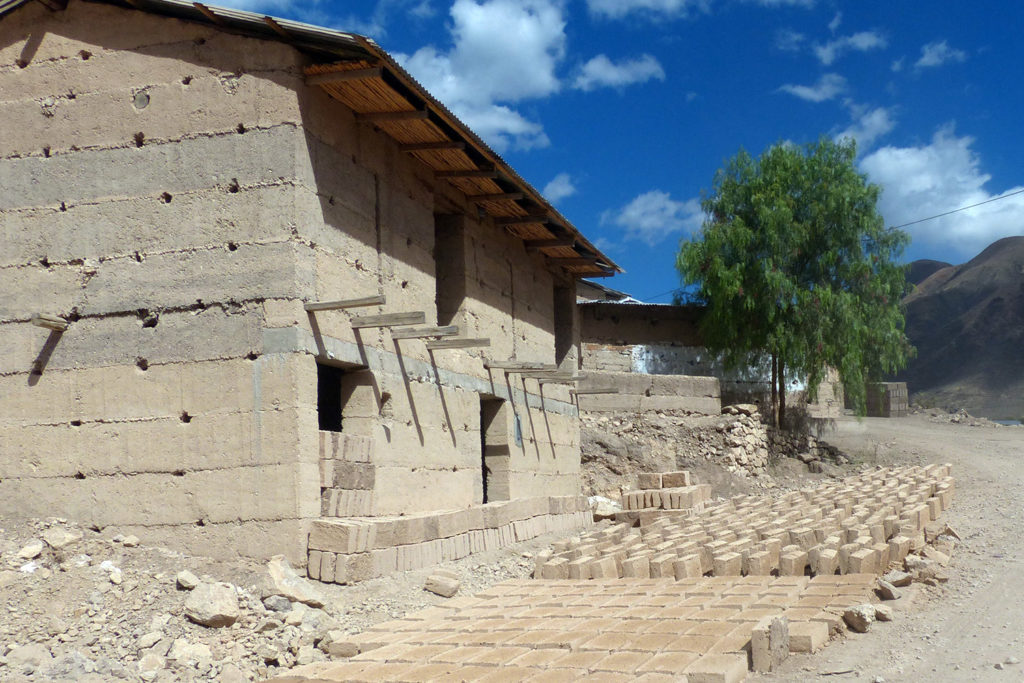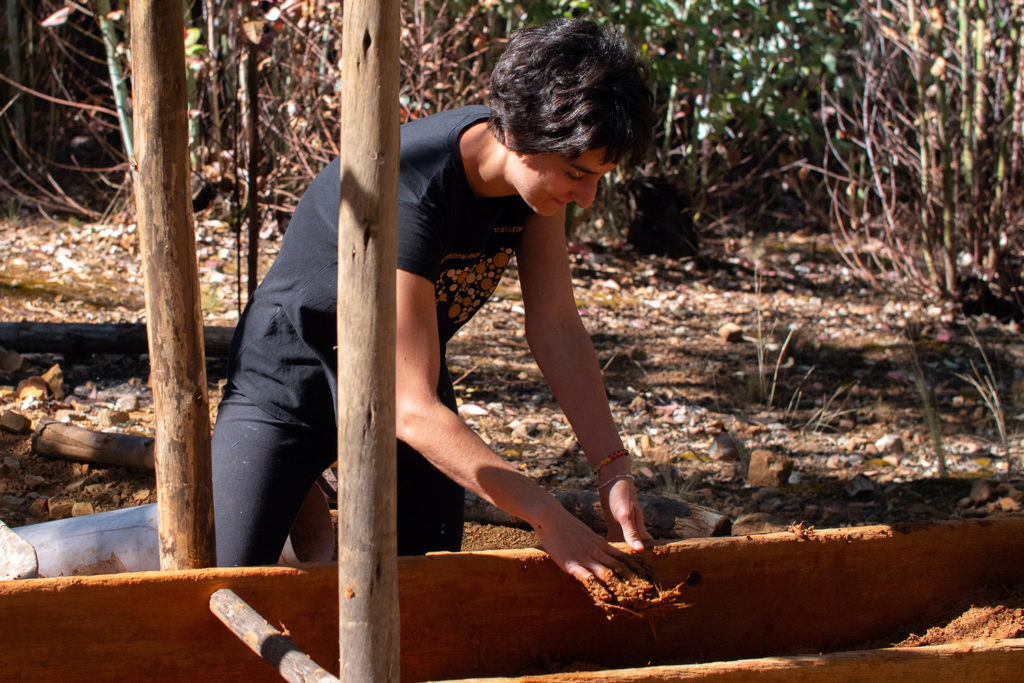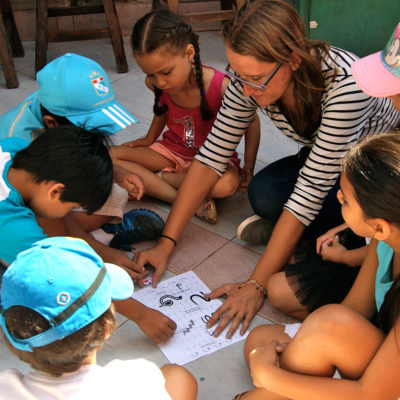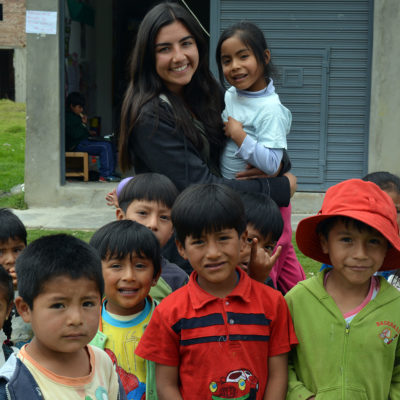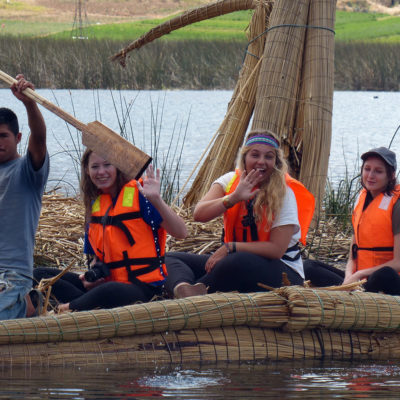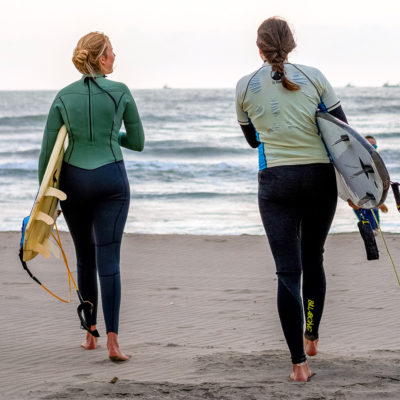Help improve living standards for local families by providing eco friendly maintenance, renovation or construction, of their mud homes and community facilities. Even if you have never built anything before, you can learn, as you participate in our program which will use eco friendly Tapial or Rammed Earth construction methods. This green building project is good for the environment and good for the people who will get to use it. You’ll immerse yourself in Peruvian culture in a very unique way!
Please note this is currently on hold. Please look for other trips in South America.
To book an activity with us we require you to participate for a minimum of two weeks. Therefore, you would need to book a quantity of two for this activity, unless you choose a separate activity to go with it. See the ‘Related trips…’ section for more options.
Eco Building Project in Peru, Cajamarca
Life for women and children in Perú is harsh and oftentimes they can barely afford daily expenses, so it is common for them to accept basic and or unhealthy living conditions such as open cooking fires, cold water showers or non, rubbish and living quarters left in bad condition for long periods of time. This is also reflected into the communal areas such as schools, churches, clinics and common facilities. Even though 60% of the houses are built in the traditional low cost adobe or tapial methods, maintenance budgets for these structures is rarely considered as a priority.
This is where we saw a way to help!
By providing materials and helping them to repair, renovate or build their traditional Tapial mud homes or communal facilities, and using the donated labour from our participants, we are able to assist the community to achieve this aim. With renovated Tapial homes and training they’ll be able to offer accommodation to rural tourists, allowing them to generate an income. At the same time, we provide an opportunity for you to engage with the community and learn more about them first-hand, as you complete these construction tasks. It is a mutually beneficial exchange!!
In addition, our program aims to revive tradition of the mud homes and to spread awareness of its benefits. Besides its unique look and feel, mud houses preserve warmth and cooling much better than much of its modern counterpart (concrete buildings) and it is actually a much better fit for the Peruvian weather. Adobe structures are generally self-made through simple construction practices that do not require as much work. Skilled technicians (e.g. engineers and architects) are not required, hence it is described as “non-engineered construction”. Your efforts will improve family homes, community halls and will help to create the first English as Second Language School for the community children.
CRB/DBS (Criminal Records Bureau) Check
It is required that participants complete a CRB/DBS (Criminal Records Bureau) check in order to take part in this project. We can provide this service for you at an additional cost because some people may already have one that is valid (please get in touch for more details).
Start dates are every week of the year with your activities starting on a Monday. We therefore request you arrive anytime on the Saturday or the Sunday. Participants arriving on Saturday will need to book an extra night in our accommodation.
Your trip will finish on the Saturday morning when you will need to vacate the accommodation.
May to October
Participants may be engaged in segments or the mud house construction process in its entirety, depending upon the length of program service.
Under the supervision of the “maestro de obra” and local workers you will be “hands on” helping in activities such as:
- Tracing the building lines in the property
- Helping setting up the foundations
- Digging on soil to mark foundations
- Setting up of the first wooden clamps/mould frames
- Mud filling and compacting of soil/mud into clamps/mould frames
- Uncovering/unmoulding clamp/mould frames
Participants will also be taught the ancient techniques of wall finishing with no paint. Instead they will be shown the process of using mud fine granite.
November to April
This is the rainy season, which means that you’ll likely be taking part in activities to help this program through light restoration and indoor construction in the communal areas, such as schools, churches, health care facilities and community centres, as well.
Programme Duration & Availability
Min duration (weeks): 1
Aims & Objectives
- Assist the locals with construction and renovation efforts in an organised team
- Create cultural exchange opportunities through our efforts with the locals
- Lend a hand to assist the local NGO in other areas including training delivery and marketing
- Develop your teamwork and skills through hands on activity
If this is your first day, an orientation will take place in Cajamarca before program transfer
Monday to Friday
- Breakfast
- Briefing
- Complete assigned daily construction tasks
- Lunch break
- Complete assigned daily construction tasks
- Dinner
- Free evening
This schedule can be changed and/or amended depending on weather conditions, local conditions and unforeseen circumstances.
Additional Equipment
- Rubber boots or waterproof shoes (if rainy season)
- Leather gloves (if rainy season)
Location
You will be staying in the district of Puyllucana which is a small village found in the east-northern part of Cajamarca.It is a beautiful location with great weather and friendly locals. Located only a short distance away from Cajamarca city (Capital and largest city of Peru’s Cajamarca Region, enriched in culture and history), this quiet location provides a relaxing atmosphere after a day out. The accommodation has a beautiful view of the Andes Mountain Range and is close to the Amazon Rainforest, it will bring you back to South American nature!
Accommodation & Food
You will be staying in our accommodation center in Puyllucana, Rural Cajamarca countryside. The house is made with traditional materials such as adobe and stone, it also has a large garden. Wi-Fi will be available only in common areas. We recommend also using 3G data if staying connected is important to you.
All participants are expected to be environmentally aware and to use all resources with restraint, especially water, paper and electricity. Although rooms will be cleaned daily by staff, you will be expected to clean up after yourself, and to play your part to keep accommodation neat and organised.
Available Room Types
|
|
Standard Room |
|
All meals included |
Yes * |
|
Free beverages |
Yes ** |
|
Persons per room |
3-5 |
|
Wifi in public areas |
Yes |
|
Laundry facilities |
Yes *** |
|
Safety box |
No |
|
Lockable rooms |
No |
|
Hot shower |
Yes |
|
Private bathroom |
No |
|
Bed linen |
Yes |
|
Towels |
No |
|
Heating |
No |
* 3 meals on weekdays, 2 on weekends
** Tea, Coffee, drinking water
*** For a small fee
Food Arrangements
The food will be typically Peruvian meaning lots of corn, beans, rice, chili peppers, potatoes, wheat, and other grains, all very vegetarian friendly. Keep in mind that some local dishes may be spicy!
Facilities
Eateries
Although there are many restaurants around this small town, “Menu centres” are a cheaper popular local choice. Known as a “Menu”, here you are offered soup and entrees before digging into your main meal and are usually accompanied by a drink, usually made from barley or tropical fruit. Menus have a smaller range of food, but are cheaper and more convenient. They act as the ‘fast food’ for the locals, who tend to dislike western fast food outlets.
Shops
Local shops are within walking distance. A short walk from our accommodation site will bring you to convenience local shops, for all your immediate shopping needs
Transportation
Our accommodation is about 3.10 Km from the main square of Baños del Inca. This is roughly 8 km, about 30-40 minutes away from the Cajamarca city center by public transportation.
“Moto-taxis” are also available for quick rides around town (up to 3 people round trip cost Banos del Inca 2 – 3 soles)
Internet use
There is Wi-Fi in your rooms as well as public areas at your accommodation, but there is also an internet cafe in the main township where you can access wifi from when you are not at the centre.
Money
There are numerous shops and ATMs in the center of town.
Medical
We will have a basic first aid kit on site, but there is a clinic available in Banos del Inca. A hospital and various clinics are in nearby Cajamarca for any emergencies or health issues that may arise.
Mandatory Orientation Day
On the Monday of your first week at this location, you will join our orientation day, to familiarise you with the surroundings as well as local culture. Your program will continue as usual from Tuesday onward throughout the rest of the week.
Schedule
- Introduction meeting, House rules, Setting Expectations, Health and Safety Advice and handling of documents.
- Peruvian Do’s and Don’ts,Peruvian Culture Lessons and Spanish Language Lessons.
- Tour around the compound and local area; where to find local shops, and arrange a sim-card if necessary.
- Lunch
- Small hike to ‘white crosses hill’ where you can have Thermal Baths in Banos (Optional) and a massage session (Optional) .
Activities & Events
Cooking Lessons: Join your cook as they prepare meals for you and other participants. Take notes, learn new recipes, traditional food preservation techniques and more! Try not to spoil your dinner as you learn!
Farm Animals: Watch the local farmers near your accommodation, as they tend to their animals in daily rituals like shearing and milking.
Sights & Surroundings: Chiclayo. You can easily reach Chiclayo, Peru’s fourth biggest city, by public transport which is cheap and frequent. Chiclayo offers shopping centers, a cinema and nightlife, but it is also a major traffic hub in northern Peru. This makes it easy to travel on the weekends or after your program.
There are plenty of small restaurants or shops around the area. There is an active surfing community and it is easy to make local friends, we can also point you to our Tandem Skydiving program and some other events.
Huanchaco
Only 12 km outside Trujillo. Once a quiet fishing hamlet, the town is now one of the best places for surfing.
Trujillo
Founded by Francisco Pizarro in 1534, Trujillo has 709,500 inhabitants. It is the home of the beautiful Plaza de Armas and its glamorous colonial. 4 hrs from our accommodation, this city by the ocean is referred to as the everlasting spring, where temperature is usually 32ºC, and where the very important Festival de la Marinera takes place.
Having said that, the main reason why most people pass through this coastal city is to visit one of Peru’s top-attractions: the Chimú adobe city of Chan Chan.
Chan Chan
Built around AD 1300, Chan Chan is the largest pre-Columbian city in the Americas, and the largest adobe city in the world. You can visit it by taking a combi from C/España. The ticket (10 S) includes entrance to the Nik-An temple, the Chan Chan museum, the Huaca la Esmeralda and the Huaca Arco Iris.
A bit further from the city, the Huaca del Sol y la Luna is over 700 years older than Chan Chan and belongs to the Moche culture. The temple is filled with icons representing Ai-Apaec, the god of the mountains, feared for provoking phenomena like El Niño. To stop him from sending heavy rains, the Moches would offer him human sacrifices.
Kuntur Wasi
The ruins of a religious structure in Peru’s northern highlands only 2 hours from our accommodation.
Cajabamba, Huamachuco
Located 5 hours away is a northern Peru town, rich with history, politics, religion, culture and hometown of the international famous muralist Jose Sabogal. Here, you can also visit unspoiled archeology sites and old monuments.
Bambamarca and Chota
Located 3 and 4 hours away, respectively, these towns are known for their festive activities in the months of June/July.
Leymebamba and La congona
Six hrs driving up north, with a little more than 4000 souls, Leymebamba is the perfect, quiet place to try visit La Congona, it can be reached on foot by hiking uphill from Leymebamba.
Museum of Leymebamba is just half an hour walking from Leymebamba. Inaugurated in June 2000, the Museo Leymebamba displays more than 200 mummies and their burial offerings recovered in 1997 from the Laguna de los Cóndores by a salvage Project directed by Centro Mallqui. Once at risk from looters and vandals, today this valuable collection is housed in the Museo Leymebamba. An initiative of The Bioanthropology Foundation Peru-Centro Mallqui, construction of the Museo Leymebamba was made possible by a donation from a group of Austrian citizens, as well as by funds from other private donors.
Chachapoyas
Also known as the Warrior of the Clouds, the Chachapoyas were a pre-Incan civilisation who lived in the cloud forests of present-day Peru. Chachapoyas contains intriguing archeological sites to explore, however the drive is 12 hours away from our Center, so good planning will be required.
Kuelap: The second Machu Picchu
Famous fortress of the mystic “cloud warriors”. One of the very few places never conquered by the Incas. Visitors describing Kuelap indicate that it is “as impressive as Machu Picchu” while it is by far not as crowded or expensive.
The government just recently decided to invest heavily into tourist infrastructure around Kuelap. Be one of the last persons discovering it while it is still relatively unknown!
Gocta
The waterfall of Gocta (771m) is amongst the highest in the world. Although methods of measurement are debatable, it got recognised as the world’s third highest waterfall, right after Angel Falls (Venezuela) & Tugela Falls (South Africa). Combine your visit with Kuelap and pick Chachapoyas as your homebase to have an adventurous weekend!
Transportation
From this location we provide free transport to your next program at the following location(s):
- Lambayeque (Chiclayo)
- Huanchaco
- Chiclayo
Accommodation
Volunteer camp with shared rooms (3-5 people per room); Basic but comfortable; You will be staying in our accommodation centre in Puyllucana, Rural Cajamarca countryside. The house is made with traditional materials such as adobe and stone, it also has a large garden. Wi-Fi will be available only in common areas. We recommend also using 3G data if staying connected is important to you.
All participants are expected to be environmentally aware and to use all resources with restraint, especially water, paper and electricity. Although rooms will be cleaned daily by staff, you will be expected to clean up after yourself, and to play your part to keep accommodation neat and organised.
Food
3 meals a day are provided on weekdays, and then 2 meals per day on weekends; the food will be typically Peruvian meaning lots of corn, beans, rice, chili peppers, potatoes, wheat, and other grains, all very vegetarian friendly. Keep in mind that some local dishes may be spicy!
Training
A full orientation and project induction takes place. You will also receive full training relevant to your volunteer role.
Support
Pre-departure help and advice; Local in-country team; 24 hour emergency support.
Donation
Part of your fee is used to buy decent equipment for the project and community you work with. If you wish to bring further donation, please make sure that this is in the form of equipment and not monetary donations.
Airport Transfers
Transfers from all airports EXCEPT FOR (LIM) Jorge Chávez International Airport are included.
- Flights
- Travel Insurance
- Visas
- Vaccinations
- Spending money
- In country travel
- Laundry service
- Extra activities not on itinerary
- Departure transfer
Preferred Duration
The Programme is a minimum of one week long. There is no preferred duration but we believe that the longer you can stay the more you will experience and benefit.
Pre-requisites
No prior experience or qualifications are required and it is important that you can speak English. All participants require a CRB/DBS check to take part in the project activities.
Ideal for
- Volunteer Holidays and Placements in Peru
- Community Work and Activity Breaks in Peru
- Volunteer Gap Years and Career Breaks in Peru
- Student Summer Holidays in Peru
- Construction project South America
- Building South America
- Construction Peru
Suitable for ages 18 to 80
Most participants are between 18 and 25, so please be aware of this. We do welcome older people because of the value and experience they bring to the community. Participants below 18 require parental consent and participants above 65 require medical clearance to take part in the project.
